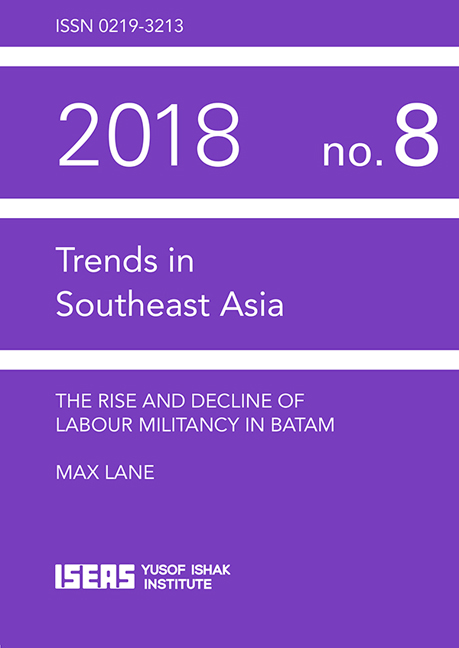
- Publisher:
- ISEAS–Yusof Ishak Institute
- Online publication date:
- February 2019
- Print publication year:
- 2018
- Online ISBN:
- 9789814818445
- Subjects:
- Economics, Economics: General Interest
- Series:
- Trends in Southeast Asia

Over the past two decades, trade union activity in Batam has been heavily influenced by regional demographics, employment conditions and the prevalent political scenario. Following the end of the New Order in 1998, the single state-authorized union was fragmented, giving rise to a number of new enterprise unions. Batam's young and diverse immigrant population, with no pre-existing loyalties to particular trade unions, made it a hotspot for industrial relations activities. Low and stagnant workers' wages throughout Indonesia and outbreak of social unrest resulted in the formation of three strong national-level unions: FSPMI, KSPSI and the KSBSI. By the mid-2000s, these unions were also active in Batam. Unsettled ethnic relations resulted in escalation of labour mobilizations from 2011 to 2013. The Garda Metal (union member formation) spearheaded a number of intense demonstrations throughout Indonesia, including Batam, during this time. The 2012 mobilization was particularly effective, and the union bodies were able to successfully negotiate for significantly higher minimum wages for all workers in Indonesia. After intervention by the Widodo government, and the signing of a harmony declaration, there has been a change in the unions' approach in demanding wages and conditions improvement. Instead of addressing employment concerns through national-level campaigns, matters are now to be resolved at the enterprise level. While there are no visible signs of a confrontational mobilization in the near future, a number of worker welfare issues remain unsettled.
 Loading metrics...
Loading metrics...
* Views captured on Cambridge Core between #date#. This data will be updated every 24 hours.
Usage data cannot currently be displayed.